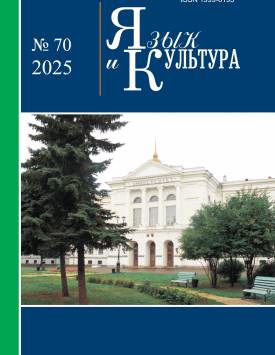The specifics of the popular science podcast genre through the prism of plain language concepts
The article explores the specifics of the popular science podcast genre from the perspective of concepts of the intelligibility of a Plain Language in the global community. Plain Language is a form of presenting textual information in a form accessible to a wide audience, that is, to a reader who is part of an almost unlimited group of everyone who can read, except for students, or to people who do not have basic functional reading skills due to physiological, age, or social reasons. According to the definition of the International Federation of Plain Language, a text is written in simple language if the choice of words and the construction of sentences in it, as well as its content, structure and design allow the reader to easily find the necessary information, understand it and use it. The podcast texts aimed at popularizing scientific ideas in society, in comparison with scientific articles on similar topics, are used as the object of research. The comparison was carried out in accordance with the criteria of clarity and accessibility, which are defined in the concept of a plain language. The relevance of the research is due to the scientific and practical potential of podcasts, as well as the uncertainty of normative attitudes and frames of a Plain Language in the Russian-speaking community. For the first time, the genre of a popular science podcast is viewed through the prism of the concept of a simple language, which allows us to identify the specifics of Russian-language podcasts and conduct a diagnostic assessment of the perception of podcasts by a wide audience. The reasons for the growing interest of scientists and researchers in using podcasts to spread scientific ideas and concepts are explained. The article considers the potential of the popular science podcast genre as an effective tool for popularizing science in the academic environment, as well as in society as a whole. With reference to existing research, the article shows by examples that the basic principles of creating popular science podcasts largely coincide with the principles of intra-linguistic translation of texts into a Plain Language, that is, adapting texts for accessibility and understanding purposes. The term "plain word" is defined, its characteristics are presented, and ways of its application in various contexts are discussed. As a method of identifying the degree of compliance of a popular science podcast with the functional characteristics of a plain language, a comparative analysis of fragments of the podcast Pump Neuron, implemented on the basis of the National Research Tomsk State University, with fragments of texts of scientific articles was used. The selected fragments were processed using the "Textometer" online service, which formulates indicators of the level of complexity and readability of the text by calculating the Flesch Reading Ease. To identify the levels of complexity of the text, the service's authors use algorithms designed to assess how easy (or difficult) it is to read the text. Thus, the study not only analyzes the texts of podcasts, but also offers new approaches to their creation and evaluation, which makes it relevant and significant for further research in the field of popularization of science. The authors declare no conflicts of interests.
Keywords
popular science podcast, plain language, readability, intelligibility, intralanguage translation, Flesch Reading EaseAuthors
| Name | Organization | |
| Kolmakov Igor E. | National Research Tomsk State University | igorkolmakov1@gmail.com |
| Nagel Olga V. | National Research Tomsk State University | olga.nagel2012@yandex.ru |
References

The specifics of the popular science podcast genre through the prism of plain language concepts | Yazyk i Kultura – Language and Culture. 2025. № 70. DOI: 10.17223/19996195/70/3
